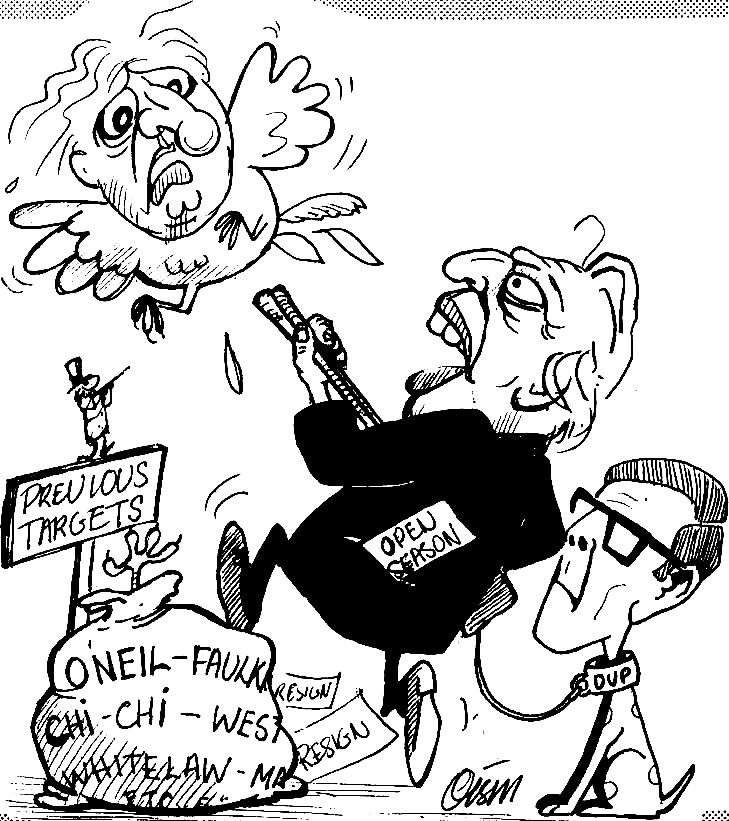We look back at the stories that were making the headlines this week in 1983
Calls for third-level college in West Belfast
A STRONG case has been put forward for the opening of a third-level further education college in West Belfast, by the Head of Community Education at St Louise’s College, Pauline Murphy.
Writing in the Community Work magazine, Scope, Ms Murphy claims hundreds of people in West Belfast are being denied further education because of a lack of facilities and calls for the city’s fourth college to be established in the area.
Echoing editorials in this paper, Ms Murphy suggests one of the two teacher training colleges which might become vacant through amalgamation would be suitable, and argues that the authorities now need to “respond to the acute need of people in West Belfast.”
Describing West Belfast as having the highest unemployment rate in Western Europe, the St Louise’s teacher calls for more education facilities to cope with the huge demand for further education.
“What provision has the BELB to offer to the hundreds of young people who have tried to get admission to St Louise’s Community Education Project on the Falls Road in the last few weeks but who have had to be turned away because already almost 300 part-time adult students – most of who joined with existing Fifth and Sixth Form classes – have been admitted?
(This influx was even more remarkable when it is realised that the project did not advertise or try to recruit students.)
Rejecting claims that the development of a college in West Belfast is not in keeping with the BELB’s policy of integration, the article continues: “It is reliably reported that these objections are emanating from the Further Education College sited two miles from the city centre in East Belfast, where there is a predominantly Protestant population. Is this location supposed to be non-sectarian? Would it not be more generous and forward-looking to propose that the fourth college be provided where there is greatest need, in West Belfast, and the work to achieve integration.”
BETTER HOUSING DEMANDED: Aidan McAteer of the West Belfast Tenants' Association addressed a crowd of over 100 who marched from the Whiterock Road to the City Hall on Saturday to protest at housing conditions and overcrowding in the West of the city. As well as Mr McAteer, Seán Keenan (Sinn Féin), Kathleen Thibideau (Gort na Móna) and Margaret Keenan (Moyard Housing Action Group) spoke at the brief meeting
New Lodge flooding
RENEWED calls for the demolition of the Sheridan Flats in the New Lodge have been made this week after sewer pipes and drains at the complex blocked up due to several consecutive days of rain.
A large stagnant pool has now formed in the yard at the front of the flats, and at one point rose to the height of ground floor dwellings.
Residents claim the drains block every winter, due to the faulty sewage system. Commented one mother: “The place is like a stinking big swimming pool throughout the winter. It’s a wonder kids don’t pick up polio or something. We are convinced that the sewers would all need re-laid,” she added.
Several months back, residents of the North Belfast flats handed in a petition to the Housing Executive demanding the complex be levelled and houses built in its place. Sinn Féin in the area have consistently backed this demand.
Said local activist Bobby Lavery: “The latest flooding is another very good reason why the flats should be demolished.”
Editorial: Kinsale life-line
THE news this week that gas from the Kinsale field is to be piped to the Six Counties would seem to owe more to political factors than pure economics.
The number of gas consumers in the Six Counties has dropped by 30,000 over the past three years, with many of them being assisted to change to other forms of energy. It is unlikely, therefore, that the 110,000 customers still left would justify, on purely economic grounds, the spending of £150 million plus, to pipe it north. This amounts to a capital expenditure of over £1 m for every 750 consumers. And even at the reported reduction of 25 per cent in gas prices, the initial investment would seem to be too high. We predict, therefore, that in the long run the result of this much publicised link-up will mean dearer not cheaper energy prices for the ordinary working class people.
In a small community of one and a half million people, it seems absurd to invest heavily in another energy source when there is an over abundance of electricity, so much so that some of the generating capacity has had to be "moth-balled", resulting in higher interest charges and increase in prices. It is highly unlikely that there is even one house in the Six Counties not linked to the electricity grid, and it would seem to make economic sense to promote electricity as the main, if not the only, energy source for this small community. If such a policy was adopted, Kinsale gas to the power stations might make sense, but as it is there is every chance that this new move will become yet another costly politically motivated gimmick which the poor people will have to pay for over and over again.
Let us not forget that political reasons scrapped the railways in the 1950s, and isolated hundreds of outlying communities; brought the M1 to Dungannon instead of Newry; sited the new University in Coleraine instead of Derry; built the new town of Craigavon on the East coast instead of West of the Bann, all with disastrous results economically and socially, which doesn't auger well for the Kinsale gas "life-line."









